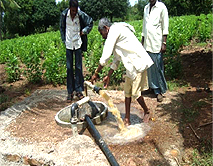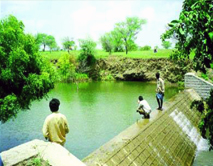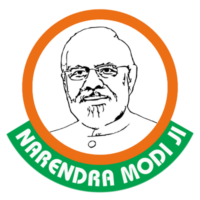Pradhan Mantri Krishi Sinchayee Yojana

Launched on 1st July, 2015 with the motto of “Har Khet Ko Paani“, the Pradhan Mantri Krishi Sinchayee Yojana (PMKSY) is being implemented to expand cultivated area with assured irrigation, reduce wastage of water and improve water use efficiency. PMKSY not only focuses on creating sources for assured irrigation, but also creating protective irrigation by harnessing rain water at micro level through “Jal Sanchay” and “Jal Sinchan“. Micro irrigation is also incentivized through subsidy to ensure “Per drop-More crop“.
PMKSY will be supervised and monitored by an Inter-Ministerial National Steering Committee (NSC) will be constituted under the Chairmanship of Prime Minister with Union Ministers from concerned Ministries. A National Executive Committee (NEC) will be constituted under the Chairmanship of Vice Chairman, NITI Aayog to oversee programme implementation, allocation of resources, inter ministerial coordination, monitoring & performance assessment, addressing administrative issues etc.
Objectives

The broad objectives of PMKSY include:
- Achieve convergence of investments in irrigation at the field level (preparation of district level and, if required, sub district level water use plans).
- Enhance the physical access of water on the farm and expand cultivable area under assured irrigation (Har Khet Ko Pani).
- Integration of water source, distribution and its efficient use, to make best use of water through appropriate technologies and practices.
- Improve on – farm water use efficiency to reduce wastage and increase availability both in duration and extent.
- Enhance the adoption of precision – irrigation and other water saving technologies (More Crop Per Drop).
- Enhance recharge of aquifers and introduce sustainable water conservation practices.
- Ensure the integrated development of rainfed areas using the watershed approach towards soil and water conservation, regeneration of ground water, arresting runoff, providing livelihood options and other NRM activities.
- Promote extension activities relating to water harvesting, water management and crop alignment for farmers and grass root level field functionaries.
- Explore the feasibility of reusing treated municipal waste water for peri-urban agriculture.
SLSC, NEC AND NSC
State Level Sanctioning Committee (SLSC) chaired by the Chief Secretary of the respective States are authorized to sanction projects, oversee its implementation and monitoring.
National Executive Committee (NEC) under the Chairmanship of Vice Chairman, NITI Aayog will oversee programme implementation, allocation of resources, inter-ministerial coordination, monitoring & performance assessment, addressing administrative issues.
At National level, programme is to be supervised and monitored by an Inter-Ministerial National Steering Committee (NSC) under the Chairmanship of Hon’ble Prime Minister with Union Ministers concerned Ministries as a members.
Farmer Friendly Initiatives

- A new scheme has been introduced to issue a Soil Health Card to every farmer. Soil Health Management in the country is being promoted through setting up of soil and fertilizer testing laboratories. 34 lakh soil samples has been collected and analysis is continuing.
- A new scheme for promoting organic farming “Pramparagat Krishi Vikas Yojana” has been launched to promote organic farming.
- A dedicated Kisan Channel has been started by Doordarshan to address various issues concerning farmers.
- Government is also encouraging formation of Farmer Producer organizations.
- Assistance to farmers, as input subsidy, has been increased by 50 percent in case of natural calamities.
- Norms have been relaxed to provide assistance from previous norm of crop loss of more than 50 percent to 33 percent to farmers afflicted by natural calamities.
- Minimum Support Price (MSP) for various Kharif crops has been increased. Bonus of Rs.200 per quintal has been announced for pulses. Area coverage under pulses has increased over the last year.
DIP AND SIP
PMKSY aims at a ‘decentralized State level planning and execution’ structure, in order to allow States to draw up a District Irrigation Plan (DIP) and a State Irrigation Plan (SIP). DIP will have holistic developmental perspective of the district outlining medium to long term developmental plans integrating three components namely, water sources, distribution network and water use application of the district to be prepared at two levels – the block and the district. All structures created under the schemes will be geotagged.
ANALYSIS OF THE SCHEME
- Progressive States: Andhra Pradesh, Gujarat, Karnataka, Madhya Pradesh, Maharashtra, Rajasthan, Tamil Nadu, Telangana
- Under performing States: Punjab, Jharkhand, Bihar, Chhattisgarh, Goa
- States where Micro Irrigation is yet to pick up: Arunachal Pradesh, Manipur, Meghalaya, Nagaland and West Bengal
Components of PMKSY

- Water Resource: Source augmentation, distribution, ground water development, lift irrigation, diversion of water from water plenty to water scarce areas, supplementing rain water harvesting beyond IWMP, MGNREGA, repair, restoration, renovation of traditional water bodies.
- Per Drop More Crop (Micro Irrigation): Installation of Micro Irrigation Systems (Drip & Sprinkler) in fields, extension activities, coordination & management.
- Watershed: Ridge area treatment, drainage line treatment, soil and moisture conservation, water harvesting structure, livelihood support activities and other watershed works.
ADVANTAGES OF MICRO IRRIGATION
- Higher Profits
- Water Saving & Water Use Efficiency (WUE)
- Less Energy Costs
- Higher fertilizer-use efficiency (FUE)
- Reduced Labour Costs
- Reduce Soli Loss
- Marginal Solis & Water
- Efficient & Flexible
- Improved Crop Quality
- Higher Yields
RELATED LINKS

